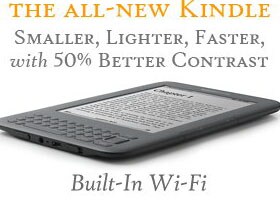
Jeff Bezos Makes Magic Out of Online Retailing
"Any entrepreneur who actually thinks he could build a $30 billion company when he starts out needs to be institutionalized," joked Amazon founder Jeff Bezos, whose dreams for his young company did come true
The business plan was hatched by a brainy computer science student from a respected East Coast university. His startup operated for a while out of a garage. He's been on the cover of Time magazine.
Bill Gates? Steve Jobs? No, Jeff Bezos – the other high-tech legend in the making with a multibillion-dollar company.
The CEO and founder of Amazon.com Inc., Bezos, 46, accepted the 2010 Entrepreneurial Company of the Year (ENCORE) award from the Peninsula Chapter of the Stanford Business School Alumni Association.
In remarks following an Oct. 27 dinner attended by about 230 alums, Bezos talked about how he started Amazon, what he finds missing in Japanese management theory, and why he likes the iPad.
The idea for Amazon first came, he said, while working for an investment fund after graduating from Princeton. "I knew web usage was growing 2,200% a year and if I wanted to start a company I'd need to hit the ground running," he said. So he wrote the business plan on a cross-country drive to Seattle, where he planned to settle. He even called a friend's attorney from the road to get the incorporation papers started – a divorce attorney, it turned out.
The company was founded in 1994 and, Bezos hesitantly admitted, first named Cadabra – as in abracadabra. It was changed three months later to Amazon after the earth's biggest river – offering earth's biggest selection.
No, he didn't think he'd be able to take the company to $30 billion (2009 revenue) in 15 years. "Any entrepreneur who actually thinks he could build a $30 billion company when he starts outs needs to be institutionalized," he said. "Any VC would look at that plan and think it was unrealistic."
Although he credited "a tremendous amount of planetary alignment – luck" for the company's growth, he did say that by "1997-98 we were sure it would be a $1 billion company. Maybe $5 billion to $10 billion if we had enough beer."
Quickly realizing that he needed seasoned people to manage that growth, the company brought in senior executives with experience operating multibillion firms. "They've been my mentors," Bezos said. "I'm always learning from my senior team."
Amazon's philosophy is to be "customer-obsessed, not competitor-obsessed, long-term oriented, and willing to be misunderstood," Bezos said. Many questioned his idea of selling books on the internet. But it turned out online retailing didn't put independent booksellers out of business, it wasn't bad for authors, and posting all kinds of reviews – even the bad ones – helped people make the right purchase decisions.
Bezos said he likes to bring new ideas to his management team and has brought in teachers of the Japanese kaizen philosophy, which focuses on continuous improvement of processes. In a moment of zen one kaizen master caught Bezos sweeping a floor and asked, "Why are you sweeping? Why not eliminate the dirt?"
"He only asked questions – where were the answers?" Bezos said to laughter from the audience.
Amazon sells many products beyond books now, but one of its top sellers is an electronic book reader, the Kindle. The company decided it needed to go beyond its skill set and build a customer-friendly way to read e-books. "The world changed and if we wanted to be the future of books, we would have to learn to build a hardware device."
Amazon doesn't reveal Kindle sales, but said this week that it sold more of its new generation e-readers in their first 12 weeks than any previous generation of the device.
Apple's iPad doesn't seem to be affecting sales negatively. In fact, some say it may be having the opposite effect, with some users reporting the device is not an ideal platform for electronic books.
You can buy books from Amazon and download them to your iPad, however, and Bezos said the company just launched a new front-end application specifically to do so. He doesn't see it as competition: "I like the fact you can lean back with your tablet and shop Amazon while lying on your sofa. I'm in favor of that."
More seriously, he said, like people need different shoes for running, for hiking and for work, people need specific devices for reading. "Kindle is the best purpose-built device for reading and there's a huge market."
This piece originally appeared in Stanford Business Insights from Stanford Graduate School of Business. To receive business ideas and insights from Stanford GSB click here: (To sign up: https://www.gsb.stanford.edu/insights/about/emails)





